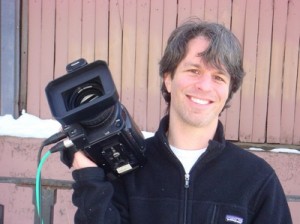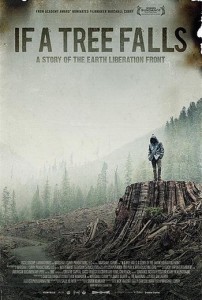
A compelling new documentary examines the radicalization of Daniel McGowan, whose 2005 arrest as a member of the Earth Liberation Front, or ELF, followed a series of arson attacks against companies and individuals he and other ELF members felt were threatening the environment. Dubbed the country’s “number-one domestic terrorism threat” by the FBI, McGowan and ELF upended environmental activism as well as the very meaning of “terrorist” in a post-9/11 age.
“How do we define terrorism? We had that idea right from the beginning,” says Marshall Curry, director of “If a Tree Falls: A Story of the Earth Liberation Front.”
Initially, he and his colleagues felt their film would be a verité-style look at their central figure because they weren’t sure how much access they’d have to the other players in this complex story. But Curry couldn’t shake the image of then-Attorney General Alberto Gonzalez referring to McGowan as a terrorist during a midafternoon press conference.

“That word stuck in my ear,” he says. “Aren’t terrorists people who try to kill other people? Daniel didn’t seem to me to be that kind of person. It felt like Gonzalez wanted to score some political points.”
But then Curry started interviewing the arson victims. “I began to hear their arguments. I saw it from their side,” he says. With more than 400 hours of footage compiled, he had lots of different ways to tell the story.
Curry realized he had an opportunity to hook the audience into something beyond the specifics of McGowan’s radicalization. “In every good documentary, there has to be, at least, that second-act twist. It’s a second tentpole for your film,” he says. “In our movie, it’s this notion of terrorism and the implications of dubbing someone a terrorist threat.”
He’s heard stories of audience members leaving a screening engaged in debate. “That’s what you hope for,” Curry says. “If we do our job well, no one will know how hard it was to strike that balance.”
It took some coaxing to win the trust of participants on both sides. “Our intention wasn’t to set up straw men and knock them down. These are complicated issues. The best thing to do was to simply put their point of view up against everyone else’s and let them bang against each other,” he says.
Curry was successful in winning over some who had already felt the sting of biased news coverage. “They could feel my sincerity, I guess. I really was honestly curious about why they do what they do.”
His producer, cinematographer and co-director is Sam Cullman. The co-editor and writer on the project is Matt Hamachek. Executive producers are Steve Bannatyne with Lucky Hat Entertainment, Simon Kilmurry for the PBS television series “POV,” Sally Jo Fifer for ITVS and Nick Fraser for the BBC.
A celebrated filmmaker himself, Curry’s previous films include “Street Fight” about the contentious race for mayor of Newark, New Jersey between upstart challenger Cory Booker and four-term incumbent Sharpe James. It won numerous prizes and citations including an Oscar nomination—”March of the Penguins” took the trophy—and a News & Documentary Emmy nod.

“It gets you meetings but it doesn’t get you money,” Curry recalls about the hoopla surrounding the Academy Awards. “This movie was still funded by lots of small grants and different groups.” He tells the story of a colleague and fellow documentarian who actually won the Oscar. “She walked offstage thinking, ‘My career is set!’ Six months later, she was back applying for grants. People will take your calls after something like the Oscar, but they aren’t going to write you a blank check.”
He is grateful to make his living as a documentarian and builds a line item into his budget to compensate himself for his time as cameraman and editor. But that salary is the first thing to get repurposed, for example, if an amazing piece of archival footage is unearthed that carries a larger-than-expected licensing fee.
In addition to some financial instability, a documentary filmmaker can spend months, if not years, researching, filming and editing. The payoff can be a long time coming. How does Curry maintain his focus?
“I love the actual work,” he says. “I love editing. There are days when I hate it a little bit more than I love it. But most days I love it more than I hate it and that’s what keeps me motivated.”
“I have an artist friend who will listen to me complaining and she’ll say, ‘So just quit!’ And I have to think about it. Do I want to quit now? That usually gets me going again.”
Citations for “If a Tree Falls” include the Documentary Editing prize at the 2011 Sundance Film Festival and best-of gongs from the Nashville Film Festival, Dallas Film Festival and Santa Cruz Film Festival.
“If a Tree Falls” opened last month in New York and premieres this weekend in Colorado, Los Angeles, San Francisco and Berkeley. It expands to Portland and Corvalis, Oregon, Minneapolis, San Diego and Seattle on July 22 with additional cities to be added throughout August and September. 
CLICK HERE for a trailer and other details at the official website for the film.
CLICK HERE for Curry’s site.


